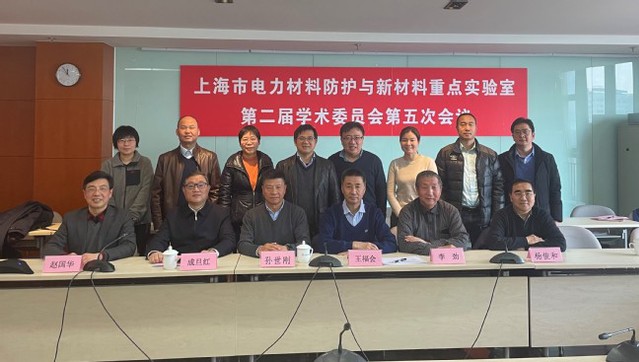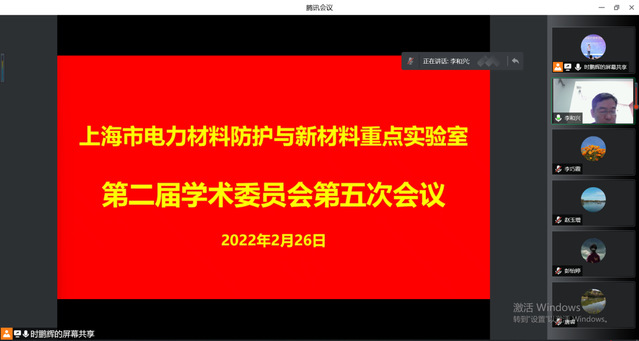On February 26th, the Fifth Meeting of the Second Academic Committee of Shanghai Key Laboratory of Electric Power Materials Protection and New Materials was held online and off the line in Conference Room 6 on the 9th Floor of the Administration Building located on Yangpu Campus.

Among those who attended the meeting off the line there are Sun Shigang, an academician and director of Academic Committee of Key Laboratory, Professor Cheng Danhong and Wang Fuhui, vice directors of the Committee; Prof. Li Jin, Prof. Zhao Guohua and Prof. Yang Junhe, all members of the Committee, along with Xu Qunjie, director of Key Laboratory. More than 30 committee members, professors and experts attended the online meeting presided by Sun Shigang. Among them there are Professor Zhu Meifang, an academician, Professor Ma Zifeng and Prof Li Xiaogang, Professor Li Hexing, deputy secretary of the Party Committee and president of SUEP, Prof. Min Yulin, Dean of the College of Environmental and Chemical Engineering, and some researchers from the key laboratory.

On behalf of the university Professor Li Hexing expressed his thanks to all the present experts of the Academic Committee for their support, promising that the university will give full support to the construction of the key laboratory. He hoped that all the experts and committee members would continue to lend their hands and give more support.
Professor Xu Qunjie reviewed the progress his key laboratory had made since 2021 and elaborated the remarkable achievements achieved in the past year. Following up, Professor Liao Qiangqiang, Professor Ge Honghua, Dr. Shen Xixun and Dr. Shi Penghui gave a report respectively on their work with the characteristics of their key laboratories, covering the topics including Research and Application of Cascade Utilization and Application of decommissioned batteries in Electric vehicles, Optimization of the Shutdown Protection Technology in Power Plants, New ideas and Application of Recycling of waste Lithium Ion Batteries and An Examination on Overfilled Charging Copper Plating and Cyanide-free Silver Plating Technology Applied in Electronic products.
The academic committee members competed to give advice and suggestions for the construction and development of various laboratories and the impending evaluation of the key laboratory, which has made great progress in the past year. All the set goals have been reached as expected and the tasks have been fulfilled smoothly as expected or more than we had expected. Next, with a benign development, the key laboratory will take further measures to meet with the national demand, condense the characteristic direction and strive to apply the electric material protection technology to the power industry. We will conduct small scale and pilot scale research on anticorrosive materials, launch industrial cooperation, try to solve the bottleneck technology in the power industry, and apply it to the power system so that we can resolve the existing problems in power system itself and strengthen the construction of key laboratory with the characteristics of electric power industry. The Committee believes that it is urgent that in the near future the laboratory focus on the missions as follows: to obtain the qualification to train talents at the doctorate level in the disciplines of chemical engineering and technology as soon as possible because the authorization of doctoral programs means a lot to facilitating the laboratory's sustainable development; to strengthen the ties with the few major well-known enterprises, and strive for more cooperation with the power-industry related enterprises so that the actual problems of the enterprises will be solved; to train and employ more talents and professionals in the domains of power material anti-corrosion so the disciplinary characteristics will be more clear-cut; and to integrate the resources with their own advantages, strive for a breakthrough to win awards at the national level so that the qualification to introduce doctorate programs in the relevant disciplines will be endorsed.
At the conclusion of the meeting, Xu Qunjie expressed his heartfelt thanks to the committee members on behalf of the Laboratory and promised that they will try to meet with the requirements of the Academic Committee by strengthening the innovation of the laboratory's own system and mechanism, further clarifying the scientific research orientation, fully integrating the research teams and develop their own advantages, and strengthening the basic research and expanding its application in the power industry so that more contribution will be made to the Municipality and even to the entire power industry.
Contributor: College of Environmental and Chemical Engineering